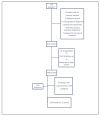Clinical Outcomes of a Zika Virus Mother-Child Pair Cohort in Spain
- PMID: 32392815
- PMCID: PMC7281364
- DOI: 10.3390/pathogens9050352
Clinical Outcomes of a Zika Virus Mother-Child Pair Cohort in Spain
Abstract
Background: Zika virus (ZIKV) infection has been associated with congenital microcephaly and other neurodevelopmental abnormalities. There is little published research on the effect of maternal ZIKV infection in a non-endemic European region. We aimed to describe the outcomes of pregnant travelers diagnosed as ZIKV-infected in Spain, and their exposed children.
Methods: This prospective observational cohort study of nine referral hospitals enrolled pregnant women (PW) who travelled to endemic areas during their pregnancy or the two previous months, or those whose sexual partners visited endemic areas in the previous 6 months. Infants of ZIKV-infected mothers were followed for about two years.
Results: ZIKV infection was diagnosed in 163 PW; 112 (70%) were asymptomatic and 24 (14.7%) were confirmed cases. Among 143 infants, 14 (9.8%) had adverse outcomes during follow-up; three had a congenital Zika syndrome (CZS), and 11 other potential Zika-related outcomes. The overall incidence of CZS was 2.1% (95%CI: 0.4-6.0%), but among infants born to ZIKV-confirmed mothers, this increased to 15.8% (95%CI: 3.4-39.6%).
Conclusions: A nearly 10% overall risk of neurologic and hearing adverse outcomes was found in ZIKV-exposed children born to a ZIKV-infected traveler PW. Longer-term follow-up of these children is needed to assess whether there are any later-onset manifestations.
Keywords: adverse outcome; arboviruses; congenital infection; microcephaly; zika virus.
Conflict of interest statement
The authors declare no conflicts of interest. The funders had no role in the design of the study; in the collection, analyses, or interpretation of data; in the writing of the manuscript; or in the decision to publish the results.
Figures
References
-
- Waldorf K.A., Nelson B.R., Stencel-Baerenwald J.E., Studholme C., Kapur R.P., Armistead B., Walker C.L., Merillat S., Vornhagen J., Tisoncik-Go J., et al. Congenital Zika virus infection as a silent pathology with loss of neurogenic output in the fetal brain. Nat. Med. 2018;24:368–374. doi: 10.1038/nm.4485. - DOI - PMC - PubMed
-
- Schuler-Faccini L., Ribeiro E.M., Feitosa I.M., Horovitz D.D., Cavalcanti D.P., Pessoa A., Doriqui M.J.R., Neri J.I., de Pina Neto J.M., Wanderley H.Y., et al. Possible Association Between Zika Virus Infection and Microcephaly—Brazil, 2015. MMWR Morb. Mortal Wkly. Rep. 2016;65:59–62. doi: 10.15585/mmwr.mm6503e2. - DOI - PubMed
-
- Del Campo M., Feitosa I.M.L., Ribeiro E.M., Horovitz D.D.G., Pessoa A.L.S., De França G.V.A., García-Alix A., Doriqui M.J.R., Wanderley H.Y.C., Sanseverino M.V.T., et al. The phenotypic spectrum of congenital Zika syndrome. Am. J. Med. Genet. A. 2017;173:841–857. doi: 10.1002/ajmg.a.38170. - DOI - PubMed
Grants and funding
LinkOut - more resources
Full Text Sources


